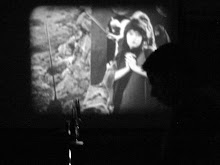Written by a Nobel laureate. Winner of the Nobel Prize in literature. Nobel Prize winning author's most prominent work. Such words on the cover of a novel do not serve to heighten expectations of most readers unlike the words 'Oscar winning' do to films. This is an impulse floating around most of my friends and relations. I guess the requirement of shorter attention spans, the associated glamor, a relative lack of profundity are some possible reasons for opinionated movie-goers. With the level of advertising for films, the engagement of film celebs in activities outside their profession (read exercise, IPL, link-ups, near imminent break-ups, nude pics on Twitter), easy scope for commodification of women, it is easier to sell films to every Tom, Sadiq and Hari. This makes it easier for almost everyone around me to comment on the slew of films 'coming to a theater near you'. Of course there are those creditable film aficionados who follow the best cinema has to offer, they will cherish the lens of Herzog, they will note the flow of scenes in Coppola's "The Godfather", they will love the adventurous Bigelow, they will not be surprised by Almodovar's effeminate men. (Start minor digression) Others will look to such folks as pretentious people. (End minor digression) Cinema does enjoy a great share of exploring adventurous followers while books often don't. To be considered an avid reader all one has to do is carry along a David Baldacci, John Grisham, and the likes. Rarely will one across a Dickens, Faukner, Kafka in between gates in an airport terminal. Rarely too will one come across Vidyadhar Surajprasad Naipaul in between gates in airport terminals. A Nobel laureate's work is almost never 'coming near you' like an Oscar winning director's film. I decided to go out, go looking for Nobel laureate Naipaul's most prominent work (trying to package this novel like a blockbuster movie here). Fortunately for me it was in my university library.
I loved the novel. There is no semblance of a plot here. Perhaps this will bother some readers but it didn't bother me. One change in my thinking I must thank a close friend and Roger Ebert for is that I now feel the story. Like Mr. Ebert says, it's not what it is about, it's how it is about it. With this perspective I must admit Mr. Biswas and the Tulsi clan is an embodiment of me, my father and my friends in some way or the other.
Mr. Biswas. What a character. An average artist, a pathetic husband, a hypocritical father, a knowledgeable reporter, an insatiable individual. Mrs. Biswas; a woman whose objectives are a series of negatives. Anand; an intelligent but estranged son. The old hen, the Gods,.......the list is endless. In which Dan Brown novel do we find such a plethora of characters?
Reading Naipaul is experiencing smells and sounds. It's about the vivid description of fish the size of your fingernails in flowing brooks, flaking walls in houses. It's a look in the myriad means of livelihood of Indian migrants in Trinidad. It's about the quest for education among Indians, the belief that milk and prunes will enhance intelligence. It's about boys paraphrasing an adult's opinions on Gogol and communism. It's about the feeling of having your first family car. It's about making promises and then breaking them. It's about flogging children. It's about fierce competition to go to college. It's about making monthly payments. Marriages. Aging. Eating. Fitness. Sugarcane farming. Corrugated roofing. Diving. Forging birth certificates. Intercaste unions. Neglected daughters. Multiplication tables. Breaking down of joint families. Bus rides. Cricket. Suits. Bicycles. Nicknames. Superiority complex. Inferiority complex.
How can a story be about everything yet be about nothing? In this it is similar to Nobel laureate Gabriel Garcia Marquez's most prominent work 'One Hundred Years of Solitude' in this sense of encompassing everything yet being about nothing. 'A House for Mr. Biswas' is like life. It poses questions like what did Mr. Biswas achieve? Why was he born? Why did his life fly by the way it did?
Amid this organized chaos of a novel I found one character in Mr. Biswas that will shape my life, I think. Mr. Biswas is not too educated but is very very well read. With the best of intentions he starts a correspondence program in writing which doesn't go far for Mr. Biswas is a lazy man, like many of us are. He joins a local literary club where his writing doesn't go down too well. His escapist writings are merely unfinished unpublished novels. Mr. Biswas doesn't create a sensational stir in the field of literature but still achieves a big feat. Anand, his brilliant but arrogant son, takes father's liking for books and goes to abroad for (literary, I think) studies on a scholarship. I like this turn of events. It makes me believe that if I expose my kid to Beethoven's symphony he may become a musician, if my wife reads Kuvempu to my child he may take to poetry, if I keep the papers of Perelman my child may choose geometric topology. Could such thoughts have come out of a Robert Ludlum?
